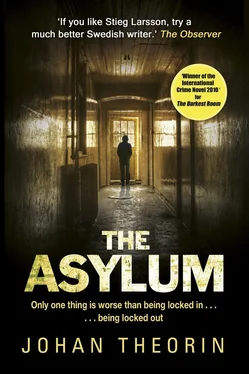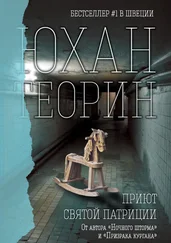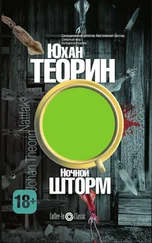Jan is not used to going up to the hospital without any children, and doing so in the middle of the night feels most peculiar.
The lift stops with a jolt. Jan checks through the window and sees that the visitors’ room is in darkness. There is no sign of life.
Slowly, carefully, he opens the door a fraction. He waits, he listens, but there isn’t a sound. Eventually he steps out on to the carpet. As always when he is inside St Patricia’s he feels an all-consuming curiosity, a nagging desire to find out more.
The furniture in the room is a collection of angular shadows, but there is a small amount of light cast by the lift behind him, and from the pane of glass in the door leading into the main hospital. Jan peers through it and sees a long, deserted corridor. And the door is locked, of course — he won’t be able to get any further this way.
All he can do is go over to the sofa, lift up the left-hand seat cushion, and tuck the envelope underneath as far as possible before rearranging the cushions. There. Job done.
With a final glance at the sofa, Jan gets in the lift and travels back down to the basement; he walks slowly up the stairs, then goes to the staffroom to make up his bed. But as usual he finds it difficult to get to sleep.
He’s involved now. He’s been working here for less than three weeks, and he’s already a part of some kind of smuggling operation.
It’s Rami’s fault . If it is in fact Rami who is Josefine’s mother, using a new name: Maria Blanker.
He lies awake in the darkness, wishing he had opened the envelope Rettig gave him. Were any of the letters for her?
Lynx
The clock was ticking. Of course Jan couldn’t hear it as he ran through the forest, but he could feel the seconds racing by; time was passing quickly. He had so much to do in such a short period of time.
The high walls of the ravine rose above him, and he could see the second red arrow. There were no signs in the undergrowth to show that little William had passed this way — but then he couldn’t have gone any other way.
Jan carried on through the open iron gate, then slowed down. He was out of the ravine now, and he stopped and gazed up ahead.
He had placed the final red arrow under a couple of heavy stones on the ground, some twenty metres beyond the end of the ravine. It was pointing up the slope, towards the open door of the concrete bunker.
William was nowhere to be seen.
Jan could feel the blood pounding in his ears like a bass drum as he clambered up the slope. For the last two metres up to the steel door he became a cat, slinking along without making a sound.
He reached the entrance to the bunker, bent down and listened. Yes, there was someone in there. He could hear a child snuffling within the concrete walls. Jan hoped he wasn’t crying — and that he was just a little boy with a runny nose from being out in the cold.
Silently he reached out and slowly closed the door. Slowly, slowly... and when it was completely shut he shot both bolts across.
The previous evening he had hidden the robot’s remote control in a plastic bag under a stone next to the bunker. He took it out and pressed the button, bringing the toy to life. He couldn’t see it, of course, but he heard his own voice, distorted and metallic, echoing inside the bunker.
‘ Wait here, William ,’ said the robot’s loudspeaker. ‘ Everything is all right, just wait here .’
Jan put back the remote control and turned away. He climbed down on to level ground and raced back towards the ravine, grabbing the red arrow on the way. He screwed it up and tucked it into his jacket pocket, then did the same with arrow number two. He slammed the iron gate shut, and when he emerged from the ravine he removed the final arrow.
He was out of breath, but didn’t slow down. Up the slope, the drums still pounding in his ears. When he reached the spot where the game of hide-and-seek had started, he looked at his watch. Three thirty-five. It felt as if it had taken much longer, but he and the boys had been playing for only ten minutes.
Suddenly he spotted a pale-green jacket between the fir trees. A little boy, crouching down in the undergrowth and trying to hide. Then he saw another of the boys slightly further away, then another.
He knew exactly where the boys were now. William was also in the right place. The plan was working; it was time for Jan to relax.
He smiled and cupped his hands around his mouth. ‘I’m coming to get you! I can see you!’
Before setting off for his night shift on Friday, Jan picks up an empty coffee cup and leaves his flat. He’s not going out this evening, just down two flights of stairs to visit his neighbour behind the door marked V. LEGÉN.
He can’t hear a sound; he has rung the bell on two previous occasions, but no one has answered. He tries again.
This time someone is coming; then there is a rattling sound. Legén has put the chain on the door, but he opens it just a fraction.
‘Evening,’ says Jan, holding up the cup.
His neighbour doesn’t say a word.
‘My name is Jan Hauger... I live upstairs,’ Jan goes on. ‘I wondered if you could spare some sugar? I’m making a cake.’
Legén stares at him like a weary boxer facing his arch enemy. He’s not in a good mood today. But he takes the cup and turns away. Jan silently steps forward and peers into the hallway.
It is dark and untidy, and it stinks of tobacco. The fabric bag he last saw down in the cellar is lying on the floor, next to the shoe rack. The text is clearly visible now: ST PATRICIA’S LAUNDRY. He was right.
Jan is wearing a satisfied smile when his neighbour returns with the cup half-full of sugar.
‘Perfect. Thanks very much.’
He is about to carry on chatting; he was intending to point to the bag and say that he actually works at St Patricia’s too, but Legén simply nods and slams the door shut. There is a click as the key turns in the lock.
Jan goes back up to his flat and tips the sugar into the bin in the kitchen.
He cycles to the pre-school at around nine o’clock, thinking all the time about the envelope he left in the visitors’ room on the Wednesday night. It should have been collected by now, and will have had some effect on the patients, although he isn’t sure what that might be.
But nothing whatsoever has changed. The concrete wall is as solid as ever, the floodlights shine out and everything is just the way it always is when he arrives at the Dell. Lilian is waiting for him tonight, and she has already put the children to bed.
‘Evening, Lilian.’
‘How are you, Jan?’ Lilian looks tired, but her voice is loud and brisk. Sometimes it seems as if the children are a little bit afraid of her, in spite of the fact that she enjoys playing with them. There is something tense yet fragile about her, Jan thinks.
‘Fine, thanks,’ he replies. ‘Ready for the weekend?’
‘Definitely.’
‘Will you be out enjoying yourself?’
‘I certainly will.’ But there is no sense of anticipation in her voice. Lilian quickly pulls on her jacket, but she doesn’t ask what Jan will be doing, and she doesn’t wish him a nice weekend. She just gives him one last glance, then leaves.
Jan is alone again, getting ready for the night.
He checks on the sleeping children, then carries out the usual routines before getting undressed. He is in bed by eleven, but as usual he finds it difficult to get to sleep. The pre-school is too warm and stuffy, the sofa bed feels narrow and uncomfortable, and out there in the kitchen a key card is longing for him to come and get it out of the drawer. But not as much as he is longing to use it.
Читать дальше












